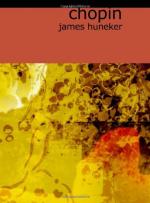Havelock Ellis is not the only aesthetician who sees the marriage of music and sex. “No other art tells us such old forgotten secrets about ourselves...It is in the mightiest of all instincts, the primitive sex traditions of the race before man was, that music is rooted...Beauty is the child of love.” Dante Gabriel Rossetti has imprisoned in a sonnet the almost intangible feeling aroused by music, the feeling of having pursued in the immemorial past the “route of evanescence.”
Is it this sky’s vast
vault or ocean’s
sound,
That is Life’s self
and draws my life from
me,
And by instinct ineffable
decree
Holds my breath
Quailing on the bitter bound?
Nay, is it Life or Death,
thus thunder-crown’d,
That ’mid the tide of
all emergency
Now notes my separate wave,
and to what sea
Its difficult eddies labor
in the ground?
Oh! what is this that knows
the road I came,
The flame turned cloud, the
cloud returned to flame,
The lifted, shifted steeps
and all the way?
That draws around me at last
this wind-warm space,
And in regenerate rapture
turns my face
Upon the devious coverts of
dismay?
During the last half of the nineteenth century two men became rulers of musical emotion, Richard Wagner and Frederic Francois Chopin. The music of the latter is the most ravishing gesture that art has yet made. Wagner and Chopin, the macrocosm and the microcosm! “Wagner has made the largest impersonal synthesis attainable of the personal influences that thrill our lives,” cries Havelock Ellis. Chopin, a young man slight of frame, furiously playing out upon the keyboard his soul, the soul of his nation, the soul of his time, is the most individual composer that has ever set humming the looms of our dreams. Wagner and Chopin have a motor element in their music that is fiercer, intenser and more fugacious than that of all other composers. For them is not the Buddhistic void, in which shapes slowly form and fade; their psychical tempo is devouring. They voiced their age, they moulded their age and we listen eagerly to them, to these vibrile prophetic voices, so sweetly corrosive, bardic and appealing. Chopin being nearer the soil in the selection of forms, his style and structure are more naive, more original than Wagner’s, while his medium, less artificial, is easier filled than the vast empty frame of the theatre. Through their intensity of conception and of life, both men touch issues, though widely dissimilar in all else. Chopin had greater melodic and as great harmonic genius as Wagner; he made more themes, he was, as Rubinstein wrote, the last of the original composers, but his scope was not scenic, he preferred the stage of his soul to the windy spaces of the music-drama. His is the interior play, the eternal conflict between body and soul. He viewed music through his temperament and it often




